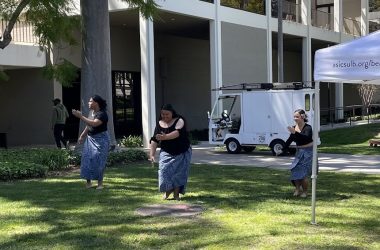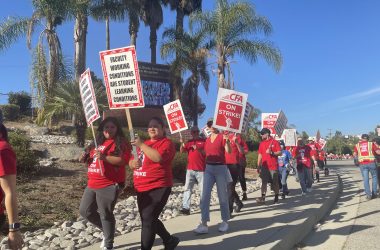Allen is a true American. He drives a Mustang, eats at In-N-Out Burger on a weekly basis and rolls through California stop signs.
Allen’s real name is Ali Sener, an international student who, until recently, changed his name on his LinkedIn account in hopes of raising his chances of finding a job. He is one of many international students in search of that big break, that first job.
Sener told the story of his friend Ahmad, who looked for a job for nine months. After those unsuccessful months, someone suggested changing his name to something more American. Ahmad changed his name to Caleb.
Caleb got three interviews the following week.
“I think that is more than a coincidence,” Sener said.
Sener, 34, graduated last May with a master’s degree in electrical engineering and, like many graduates, the recession has hit him hard, making the search for a job even more difficult. As an international student, Sener has even more obstacles to overcome when finding a job in a country that he doesn’t want to leave.
Coming to America
International students come to America for a variety of reasons. Ankur Khandelwal, 25, heard that CSULB had a good engineering program and wanted to get a global perspective, as well as improve his prospects for a higher paying job if he decided to return to India.
Sener came to the U.S for different reasons. He believed that the U.S. would give him a better education than he would receive back home.
“The U.S has a very good reputation for higher education,” Sener said. “Whether or not that is true, is another argument.”
Sener believed he would have been better off if he received his bachelor’s degree in his home country of Turkey and waited to come to the U.S. to receive his master’s. He was unimpressed with the difficulty of the bachelor’s program. He said the level of knowledge between American high school graduates and those from Turkey is significantly lower.
Still, whatever their motivations are, just trying to get into the country is a hassle for many students. In some cases, the volume of people applying for visas clogs the system and makes students wait longer than anticipated. For others, the paranoia from the 9/11 attack has held potential students back.
“The U.S. has particular countries that I think they are more concerned about than others, so some students will find that it is taking a lot longer or [the U.S. government] will be asking for a lot more clarification,” said Inemesit Williams, director of International Student Services.
However, getting into the country is only one aspect of the struggle. Learning to live in the U.S. is the most difficult part for international students.
American experiences
“Most students are aware of the challenges they will face, but experiencing the challenges is different than being aware of them in the first place,” Williams said.
Khandelwal recalled one humorous mistake he made when he first came to the country. In his native India, students are taught British English. After a few weeks in the U.S., he and a fellow international student went to the store for cigarettes. They asked the woman at the counter for “fags,” the British word for cigarettes. It was a few months later when he realized why the woman at the counter was looking at him strangely.
Other international students face challenges that no American would expect.
“I’ve pulled over to the side of the road to ask for directions,” Sener said. “Instead of telling me where the street was, a man said, ‘Why don’t you just go home?’ “
In fact, both Khandelwal and Sener have been a victim or heard stories from their friends of racism during their stay in the U.S.
“After 9/11, there was so much hatred injected in the U.S just because some people needed to make a statement,” Sener said.
Despite the racial tensions, Khandelwal and Sener learned to ignore the comments.
“You just learn not to listen to it,” Khandelwal said. “If I did, I probably wouldn’t be here still.”
Finding a job, the big break
For international students, receiving their first job is similar to an actor getting their big break. But it needs to happen quickly. Sixty days before or after graduation, international students who want to find a job in the U.S. must file for Optional Practical Training, which provides a work permit for one year. Within that year, the work visa allows 90 days of non-work or job hunting. The limit, however, does not mean that students must leave after 90 days if they do not find a job. According to Williams, there are ways around this restriction that are perfectly legal.
“There is a list of what constitutes a job and one of them is that you can be a volunteer,” Williams said. “I don’t know if all international students are tapping into these options.”
Nevertheless, most students aren’t willing to pay the cost of living to stay longer in light of the unlikely circumstances of getting job.
The American dream
International students are frustrated that many employers lack knowledge of the hiring process.
“All some employers know is that they have to ‘sponsor’ you for a visa and think it is this huge responsibility when, in actuality, it is nothing. It’s just paperwork,” Sener said.
To sponsor a student for a work visa, employers must hire lawyers to fill out the extensive paperwork. The total cost is around $3,000 to $5,000, and employers are required to pay it.
However, many employees in that situation are willing to cover the paperwork cost, according to Williams.
“We are talking about $60,000 jobs. That is not big money,” said Sener, explaining why international students would pay the paperwork cost for them to get a job.
When international students qualify for a work visa, their time in the U.S. is still ticking away. Work visas are good for three years, so if an employer is satisfied with their employee, they must reapply for the visa for another three years. After working six years in the U.S., employers must sponsor the employee for residency.
Even with all the hurdles in front of them, international students are still often surprised with the difficulties they face while trying to get a job. Khandelwal said he has sent in hundreds of applications.
“When I came here, I didn’t think it would take a while to get a job,” Khandelwal said. “I thought if I just struggle, things will work out. But I have been struggling for a while. Sometimes I lose hope in the American dream, especially during the job search.”
Sener also thought that if he worked hard, he would be able to stay in the country.
“Before I came to the U.S., I always thought of this country as the heart of capitalism. You get what you deserve, if you are the best,” Sener said. “But I’m seeing that there is much more to it than who is the best for the job. It is not that simple.”
Staying here
Khandelwal found his big break two weeks ago with an irrigation company, Drip Research Technology Services.
“I got the call and I was so excited,” Khandelwal said. “I lost words. All I could say was, ‘OK.’ The next thing I did was call my family back home.”
According to Williams, because of the finances involved, studying in America is often a decision made by the whole family, which was certainly the case for Khandelwal.
“I know how much my family was counting on me and they were so supportive during the whole process, pushing me to be strong. This job probably means more to them than it does to me,” he said.
Sener is still looking for a job. But while he is frustrated that he cannot find a job, he also understands the situation the U.S. government faces.
“Every government has the job of protecting their citizens,” Sener said. “If a U.S citizen is unemployed, you can’t really expect someone to hire you. That, I can understand.”
Disclaimer: The Daily 49er is not responsible for Postings made on www.daily49er.wpengine.com. Persons commenting are solely responsible for Postings made on this website. Persons commenting agree to the Terms of Use of the website. If Postings do not abide by the Rules of Conduct or Posting Regulations as listed in the Postings Policy, the Daily 49er has all rights to delete Postings as it deems necessary. The Daily 49er strongly advises individuals to not abuse their First Amendment rights, and to avoid language suggestive of hate speech. This site also encourages users to make Postings relevant to the article or other Postings.



